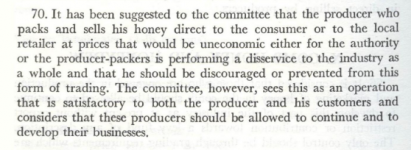Fifty years ago - back in 1972 - the beekeeping industry awaited the (pretty major and important) Caucus Committee Inquiry into the NZ Honey Industry.
http://www.beekeeping.nz/NZBDA/timeline/1972_Caucus_Inquiry_Report.pdf
Allan Dick (the main author) was the Parliamentary Under-Secretary to the Minister of Agriculture, and having opened previous NBA conferences it was expected to be a lively event. Though some of the recommendations of the Committee were seen as acceptable, others were not. I'll bet there were some bkprs who were making notes of the questions they would have for the Under-Secretary when he fronted to the Kaitaia conference in July 1972.
But then, sadly and suddently, there was some "pressing business in the House", and Mr. Dick backed out of attending shortly before the conference. But all was not lost - keen personnel in the old "P and T" (Post and Telegraph Dept) sorted out a way so that the Under-Secretary could still be in Wellington - but speak into a microphone that was amplified into the NBA conference hall in Kaitaia.
And for Mr. Dick, this arrangement had added advantages - not only did he not have to front the bkprs, but he was not able even to hear anything from the people at conference, so was unable to take their questions. He just made an opening set of remarks, but it was noted that (somehow???) he had been able to hear the applause that concluded his address. I'm not sure how that worked.
This, only 50 years ago, was touted as cutting-edge technology in the communications sector - the NBA was quite proud of the attention it got!
http://www.beekeeping.nz/NZBDA/timeline/1972_Caucus_Inquiry_Report.pdf
Allan Dick (the main author) was the Parliamentary Under-Secretary to the Minister of Agriculture, and having opened previous NBA conferences it was expected to be a lively event. Though some of the recommendations of the Committee were seen as acceptable, others were not. I'll bet there were some bkprs who were making notes of the questions they would have for the Under-Secretary when he fronted to the Kaitaia conference in July 1972.
But then, sadly and suddently, there was some "pressing business in the House", and Mr. Dick backed out of attending shortly before the conference. But all was not lost - keen personnel in the old "P and T" (Post and Telegraph Dept) sorted out a way so that the Under-Secretary could still be in Wellington - but speak into a microphone that was amplified into the NBA conference hall in Kaitaia.
And for Mr. Dick, this arrangement had added advantages - not only did he not have to front the bkprs, but he was not able even to hear anything from the people at conference, so was unable to take their questions. He just made an opening set of remarks, but it was noted that (somehow???) he had been able to hear the applause that concluded his address. I'm not sure how that worked.
This, only 50 years ago, was touted as cutting-edge technology in the communications sector - the NBA was quite proud of the attention it got!



